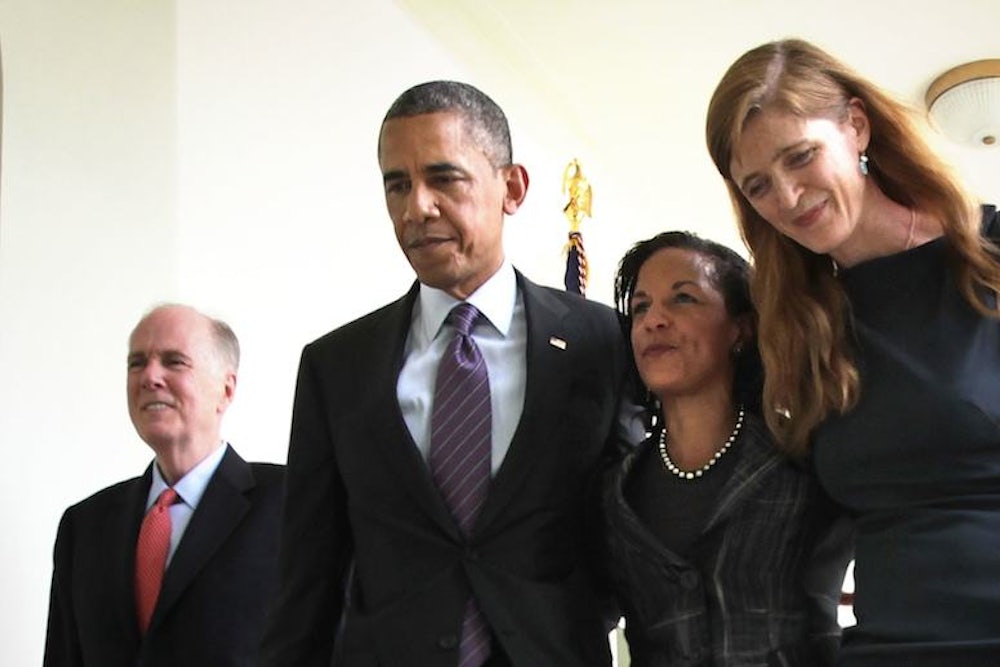In the annals of presidential appointment-making, Barack Obama displayed unusual coherence with his simultaneous announcement of Thomas Donilon’s departure as national security advisor, U.N. Ambassador Susan Rice’s elevation to Donilon’s position, and Samantha Power’s nomination to return to the administration as Rice’s successor. No lengthy search process, protracted infighting, or Oval Office agonizing—just one fell swoop. Obama looked like a president who was getting exactly what he wanted, when he wanted it.
Rice and Power are both confidants of the president; that they should be moving up in his second term comes as no surprise. After Hillary Clinton formally announced her departure as secretary of state, the White House hinted that Rice was Obama’s first choice for the job. But Republicans pitched a preemptive fit over Rice: They denounced her for her Sunday-show description of the Sept. 11, 2012, attacks on U.S. diplomatic posts in Benghazi, Libya, as a protest over an anti-Islam movie trailer that got out of hand. Rice's confirmability in doubt, Obama passed over her in favor of the current incumbent, then-Senator John Kerry. Or so the story goes.
I have always had my doubts about how seriously to take the description of Rice as Obama’s top choice for Foggy Bottom. The bing-bing-bing character of the announcement last week showed what a decisive president looks like, which might suggest that Rice as national security may have been the plan all along. Clinton first declared in early 2011 that she’d be leaving at the end of Obama’s first term, and made a formal announcement days after last year's election. Obama announced Kerry’s selection on December 21. He had plenty of time to put Rice forward. Did Benghazi stop him, making Rice a scalp for the GOP? Or did Obama always see national security advisor as the logical next step for Rice? If so, Republicans were flattering themselves a little with the conclusion that they were the ones who stopped her advancement.
Power left the government in January with the intention of returning after a little time off—to what position, no one knew. As recently as the day before Obama's announcement, speculation was circulating that she was heading for a senior State Department slot as under secretary for Global Security, Democracy and Human Rights. That would have made sense given her work on the senior staff at the National Security Council, especially in setting up the administration’s new Atrocities Prevention Board, an interagency group dedicated to identifying potential trouble spots and early action to avert mayhem. But it’s also a job in which one could be swamped by bureaucracy. The U.N. job makes even more sense for Power if Obama saw potential for her as one of the key public faces of his administration.
Opinion seems somewhat divided over whether the two appointments will have a big impact on the administration’s foreign policy. The usual first question is what kind of a national security advisor Rice will be: interagency broker or guiding hand? This question probably misses the point, given her closeness to Obama. She will certainly shape policy not only by getting what the boss wants done, but also by influencing what the boss wants.
As for Power, again, it’s not only that she will be representing Obama’s views at the United Nations. She will also have some influence on those views. It would be exceedingly strange, given her pedigree as a champion of human rights, if those issues weren’t front-and-center during her tenure at the U.N.—which is to say, if Obama selected her despite her humanitarian portfolio rather than because of it.
Both Rice and Power reportedly have long been pushing internally for a bigger U.S. role in Syria. Indeed, Rice’s tenacious but futile pursuit of a Security Council resolution isolating the regime of Bashir al-Assad must have been an education in itself about the limitations of policymaking via the U.N. Power, to judge by her classic book A Problem from Hell: America and the Age of Genocide, will take her place at the U.N. with a rich understanding of how convenient Security Council inaction can be when policymakers don’t really want to do anything to avert atrocities.
It would be a mistake to dismiss the importance of human rights implicit in Obama's promotions of Rice and Power. He may regard the situation in Syria as tragic in the classical sense: doomed to turn out badly whether the United States intervenes or not. But he has now promoted two women who generally take the view that, if indeed we are damned if we do and damned if we don’t, then we might as well. Obama's elevation of Rice and Power may not be a direct response to the manifest failure of his administration to come up with anything effective on Syria, but he could easily have picked an anti-interventionist national security advisor and U.N. ambassador, and he didn’t.
In the long run, the happiest people in town about Rice and Power's promotions may turn out to be the dwindling ranks of humanitarian interventionists among Democrats—and the neocons. At the moment, many of the latter are too busy beating up Rice over Benghazi to notice, but given the givens—a Democratic administration whose chief has a keen sense of the limitations of American power and influence—Rice and Power are about the best that those who believe in the continuing efficacy of American power could hope for.
